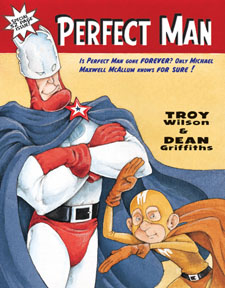 Home > CR Reviews
Home > CR Reviews Perfect Man
posted November 12, 2004
Perfect Man
posted November 12, 2004
 Creators: Troy Wilson
Creators: Troy Wilson, Dean Griffiths
Publishing Info: Orca Book Publishers, $16.95, 32 pages, 2004
Ordering Numbers: 1551432862 (ISBN)

Despite mixing words and pictures,
Perfect Man is much more a children's book about superheroes than it is a comic. Although most blogs and comics magazines seem to disagree, and certainly marketing people do when it comes time to getting out the word, just because it's about superheroes doesn't mean it automatically has interest for people who enjoy comics. I'm afraid I know next to nothing about children's books. I remember (1) I really liked one set in the Old West when I was a kid, with a Pinkerton detective, (2) I was really creeped out by one about caterpillars that showed them intimately hugging and had a creepy hippie allegory about large piles of people climbing on top of one another, and (3) that as a tiny little bugger I was fond of the Sesame Street effort about the monster at the end of the book, a thin volume I frequently see at grocery stores today. I may own the children's works of Art Spiegelman, Richard McGuire, and Lorenzo Mattotti, but do I know enough to make an informed judgment on an individual book of that type? Not really.
I have nothing against
Perfect Man; it seems like a pretty fair example of a children's book to me. The pictures are handsome enough, I guess, though not particularly so; the language has that talking-to-kids plaintive quality, and the story marches you through a self-transformation of the kind I liked when I was a kid: the lead kid character becoming an older, cooler and achievable version of how he's presented throughout. There's something about the way kids latch onto material about those slightly older than themselves, such as the television soap operas that tend to play at an age group just below that represented, that indicates anticipating what's going to happen to you next holds significant power.
Reading this book as an obnoxious know-it-all adult, I think the reality depicted is a tad too generic for this to be a really good example of its genre. Its imagery and take on superheroes is largely forgettable. The plot shifts twice, once when the kid meets an influential teacher, and once at the end when he goes out to have the life experiences that will take the place of idol worship. Both changes are really abrupt, particularly the first one, and that one in particular hinders the book because it diminishes the power of the character's crucial realization about the wisdom of seeking out one's own heroic path. It may work for kids, but it didn't work for me, and I'm very immature.


